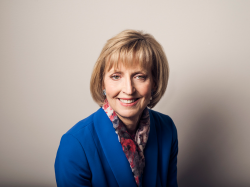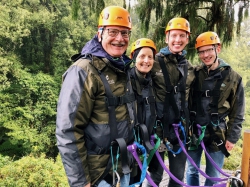Opening Opportunities for Others
PROVO, Utah – Mar 12, 2021 – During her career in higher education, BYU Marriott School of Business alumna Alison Davis-Blake has prized building mentorship relationships with students and colleagues. She loves to see people choose their own educational paths and succeed as professionals.
As a BYU undergrad studying economics, Davis-Blake became interested in a career in higher education through her work as a teaching assistant for Economics 101. “My experience as a TA resonated with me because it pushed me to learn concepts in a deeper way,” says Davis-Blake, who earned an MOB degree from BYU Marriott in 1982 (an area of study that has since been assimilated into BYU Marriott’s MBA program). “I also found that I enjoyed teaching. My interest in teaching continued as I worked as a TA for the Organizational Behavior 321 class as a master’s student.”
Davis-Blake continued her education at Stanford University, where she earned a PhD. “I chose to attend Stanford because it offered a multidisciplinary program that integrated psychology and sociology into a study of organizations,” she says. “I studied with some of the greatest names in the field, including Nobel laureate and psychologist Amos Tversky, who along with Daniel Kahneman earned the Nobel Memorial Prize in Economic Sciences. The program encouraged us to go across campus and learn about different topics.”
Since earning her PhD, Davis-Blake has worked at universities across the country, including as senior associate dean of business at the University of Texas at Austin and as dean of business at the University of Minnesota and at the University of Michigan. She also served as president of Bentley University in Massachusetts. Currently, she works as an executive leadership fellow at the University of Minnesota Carlson School of Management
As a university administrator, she encounters new problems to solve every day. “I don’t have a typical day of work. Every single day, regardless of what is on my calendar, at least one thing happens that I don’t expect,” she says. “Sometimes that’s a big thing, and I have to clear my calendar. I’m constantly facing interesting new problems that I have to tackle.”
Davis-Blake resolves many challenges that impact large institutions, but she also makes a difference at the individual level. “I have a passion for the power of education to change lives. I’ve had plenty of opportunities to talk with people about their aspirations and to guide them to the right education for them,” she says. “In an administrative role, I deal with large numbers of people, and that has some benefits. However, the impact on the individual has also been rewarding to me.”
She especially enjoys focusing on women interested in business or in teaching business. “When I was an undergraduate student, I was the only woman in all of my upper-division economics classes, and I did not have any female professors in economics,” she says. “I’ve dedicated myself to mentoring a new generation of female faculty and students.”
As Davis-Blake reflects on her career to this point, she views her mentorship opportunities with pride. “I look around the country and see deans, presidents of universities, and faculty members that I’ve mentored,” she says. “I’ve been successful in making the professoriate more diverse in terms of gender. People who I’ve mentored have done great things, and they’ve opened up new pathways of business education. I am grateful for these opportunities and the influence I’ve been able to have.”
Media Contact: Chad Little (801) 422-1512
Writer: Kenna Pierce





